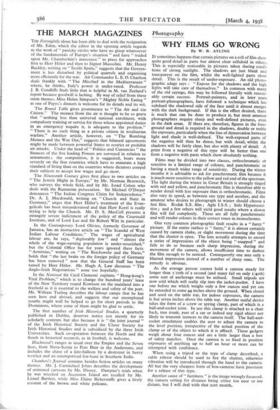THE MARCH MAGAZINES
THE Fortnightly alone has been able to deal with the resignation of Mr. Eden, which the editor in the opening article regards as the work of " panicky circles who have no grasp whatsoever of the fundamentals of Europe's situation " and have " traded upon Mr. Chamberlain's innocence " to press for approaches first to Herr Hitler and then to Signor Mussolini. Mr. Henry Buckley, writing on " Inside Spain," suggests that the Govern- ment is less disturbed by political quarrels and organising more efficiently for the war. Air Commander L. E. 0. Charlton deals frankly with " The Mischief in the Mediterranean " where, he thinks, Italy's power is under-rated. Professor J. B. Condliffe finds little that is helpful in M. van Zeeland's report because goodwill is lacking. By way of relief from these stern themes, Miss Helen Simpson's " Mighty Noble Eating " at one of Pepys's dinners is welcome for its details and its wit.
The Round Table gives prominence to " The Air and the Citizen." The menace from the air is thought to be so grave that " nothing less than universal national enrolment, with compulsory training or service for those whose appointed duties in an emergency require it, is adequate to the problem." " There is no such thing as a private citizen in totalitarian warfare." Another article, however, on " The Bombing Menace and the Way Out," suggests that bilateral agreements might be made between powerful States to restrict or prohibit air attacks. Under the head of " Politics and Currencies " the finances of the five leading Powers are surveyed in relation to armaments ; the competition, it is suggested, bears more severely on the free countries which have to maintain a high standard of living than on the countries where dictators compel their subjects to accept low wages and go short.
The Nineteenth Century gives first place to two articles on " The Jewish Might in Europe," by Mr. Norman Bentwich, who surveys the whole field, and by Mr. Israel Cohen who deals with the Rumanian persecution. Sir Michael O'Dwyer denounces " The Indian Congress Claim for Independence." Dr. A. J. Macdonald, writing on " Church and State in Germany," urges that Herr Hitler's treatment of the Evan- gelicals has been misunderstood and that Herr Kerrl is really trying to help the Church. Mr. D. S. MacColl presents a strangely severe indictment of the policy of the Courtauld Institute, and of Lord Lee and Sir Robert Witt in particular.
In the Contemporary Lord Olivier, formerly Governor of Jamaica, has an instructive article on " The Scandal of West Indian Labour Conditions." The wages of agricultural labour are, he says, " deplorably low " and " almost the whole of the wage-earning population is under-nourished," but the Colonial Office has for years ignored these facts. " Arminius," writing on " The Reichswehr and the Nazis," holds that " the last brake on the foreign policy of Germany has been removed " now that the General Staff has been tamed by Herr. Hitler. Mr. Hugh A. Law discusses " The Anglo-Irish Negotiations " none too hopefully.
In the National Sir Cecil Clementi explains " Hong-kong's Vital Problem," which is to change the hundred years' lease of the New Territory round Kowloon on the mainland into a freehold as it is essential to the welfare and safety of the port. Mr. William Teeling describes the labour camps that he has seen here and abroad, and suggests that our unemployed youths might well be helped to go for short periods to the Dominions, where some of them might be glad to settle.
The first number of Irish Historical Studies, a quarterly published in Dublin, deserves notice not merely for its scholarly contents but also because it is " the joint journal " of the Irish Historical Society and the Ulster Society for Irish Historical Studies and is subsidised by the three Irish Universities. Such co-operation between the North and the South in historical research, as in football, is welcome.
Blackwood's ranges as usual over the Empire and the Seven Seas, from Nova-Scotia to Port Blair in the Andamans, and includes the chase of a kite-balloon by a destroyer in heavy weather and an extemporised fox-hunt in Southern India.
Chambers's Journal contains besides fiction articles on many themes. Mr. J. Carmichael Johns describes the development of animated cartoons by Mr. Disney. Dampier's trials when he was wrecked on Ascension Island are recalled by Mr. Lionel Bartlett, while Miss Elaine Bickerstaffe gives a lively account of the brown and white pelicans.






































































 Previous page
Previous page